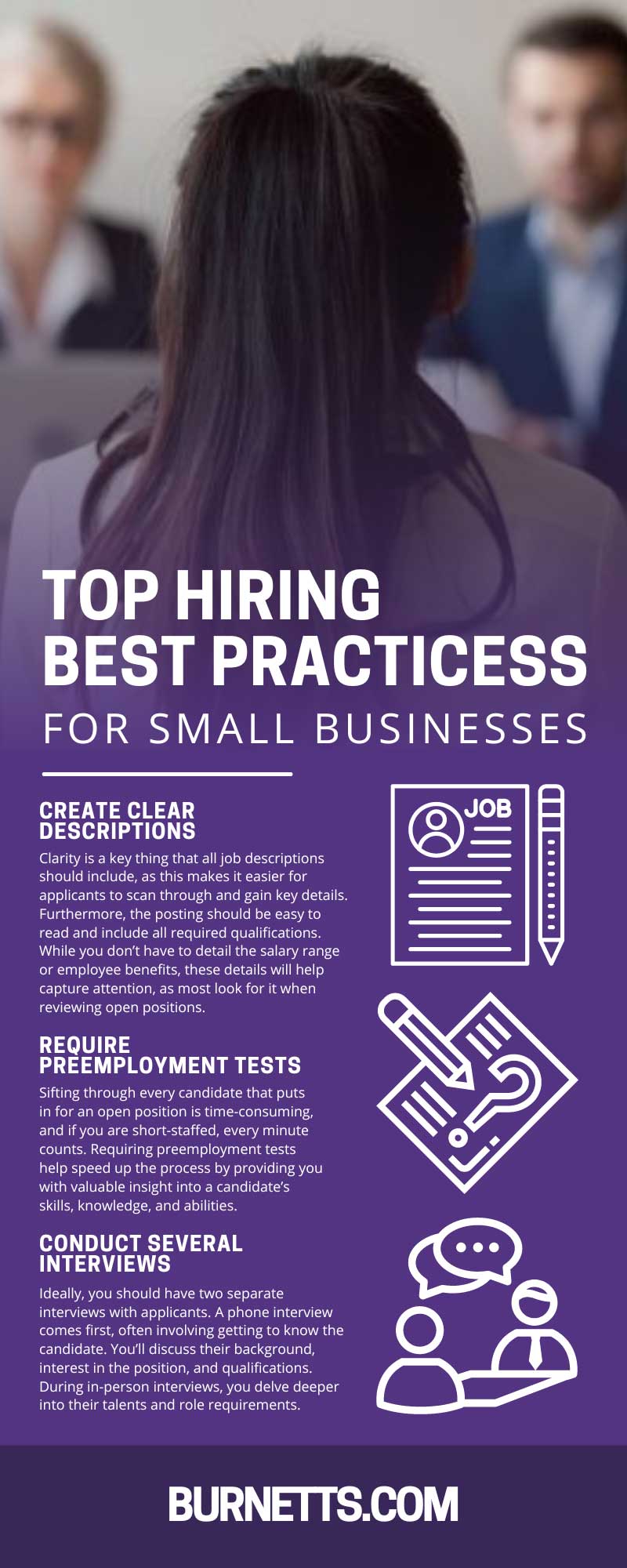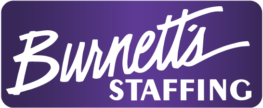
Finding the right talent to join your small business team can be challenging. Hiring new employees requires creating job descriptions, reviewing applications, conducting interviews, and finally deciding on the right person. Not sure how to go about this in the appropriate amount of time? In this employer’s guide, we’ve noted the top hiring practices for small businesses.
Write About Your Brand
One effective strategy to attract top-notch talent is to write about your brand and its values. You should do this on your company website and all job descriptions.
Writing about your brand gives job seekers a clearer idea of your company’s values and goals. Candidates can determine whether your values align with theirs before applying.
Additionally, writing about your brand can help you stand out from competitors by showing why your company is different. You may emphasize giving back to the community or prioritize worker well-being. No matter what it is, note this to prove why your company is unlike the others.
Create Clear Descriptions
Clarity is a key thing that all job descriptions should include, as this makes it easier for applicants to scan through and gain key details. Furthermore, the posting should be easy to read and include all required qualifications. While you don’t have to detail the salary range or employee benefits, these details will help capture attention, as most look for it when reviewing open positions.
List All Qualifications
You may have a clear picture of a suitable candidate as an employer, but you need to communicate this to attract the right talent. When developing the job description, include all requirements, such as:
- Education level
- Years of experience
- Hard and soft skills
- Specific certifications
Listing all this in the job description reduces the risk of unqualified candidates applying for the position.
Pro Tip
When listing qualifications, carefully evaluate them against the needs of the job. If you need a receptionist, they should be organized, have great time management, and be friendly.
Highlight Company Perks
As you create job descriptions, you should also include any company perks or benefits of working for your company. Examples of this include:
- Rolling start times
- Hybrid work environment
- Ample paid time off
- Offering volunteer time off
- Collaborative work culture
When competing with other employers for top talent, outlining the perks of working at your small business pushes you forward. List these within job postings and in the “Employment” section on your company’s website.
Require Preemployment Tests
Sifting through every candidate that puts in for an open position is time-consuming, and if you are short-staffed, every minute counts. Requiring preemployment tests help speed up the process by providing you with valuable insight into a candidate’s skills, knowledge, and abilities.
Moreover, these exams also help you save time and money after hiring candidates. Training new employees is another time-extensive process. If a candidate deceives you during interviews, you may waste time and money teaching them skills they claim to have.
Encourage Employee Referrals
Another one of the top hiring practices for small businesses to recruit the best individuals is creating an employee-based referral program. This encourages current employees to refer friends, relatives, and past colleagues that meet the qualifications for the position. Employee referrals are highly beneficial because you can trust current workers, especially in a small company where it’s easier to know the entire team.
Employers with referral programs often offer incentives to current workers, such as bonuses, extra vacation days, and public recognition. By rewarding employees in exchange for new hires, you further encourage workers to refer potential candidates.
Conduct Several Interviews
Ideally, you should have two separate interviews with applicants. A phone interview comes first, often involving getting to know the candidate. You’ll discuss their background, interest in the position, and qualifications. During in-person interviews, you delve deeper into their talents and role requirements.
Phone Interview Tips
A phone interview is usually the first step in the hiring process. This stage helps you filter out those who don’t meet the job’s basic requirements.
To ensure the phone interview is successful, create a list of questions in advance to ask the candidate. Having a script lets you know how and where to lead the conversation. During the interview, do the following:
- Actively listen to the candidate’s responses
- Take note of all crucial information
- Maintain professionalism
- Be clear with all questions
After the call, review the notes to determine whether to move forward with an in-person interview. Once you’ve decided on the next step with each candidate, individually call or email them so they know.
In-Person Interview Tips
The next step is to meet the qualifying candidates in person or virtually, depending on whether it’s a remote position. This stage is to assess their skills, experience, and personality. During in-person interviews, you should:
- Prepare a list of open-ended questions in advance
- Take time to explain the company culture
- Discuss the role and key responsibilities
- Maintain a professional, informative, and serious tone
If the applicant had to perform a preemployment exam, discuss the results of it. Additionally, ask them how they go about professional tasks. Do they prefer working alone or with others? Now’s the time to get to know the candidate and understand their work ethic.
Don’t Leave Candidates Hanging
While deciding on the perfect applicant shouldn’t be a rash decision, you also shouldn’t waste several weeks on this. By doing this, you risk losing candidates completely; some may assume you’ve ghosted them. Keep applicants updated on where you are in the hiring process so they feel valued.
Work With Recruiters
A company’s success hinges on the quality of its staff, and even one bad hire can lead to financial losses, wasted resources, and damage to team morale. The problem is, creating job postings and going through the hiring process take time.
Working with professional employee recruitment services allows experts to track down and interview the top candidates for you. This gives you more time to focus on other work-related tasks while ensuring you add the needed members to your team.
Burnett’s Staffing
We’re a staffing recruitment agency located in the Dallas–Fort Worth, TX, area and have helped countless companies add professionals to their teams. Contact us today so we can get to know your company culture and needs to help you find the ideal new hires.

